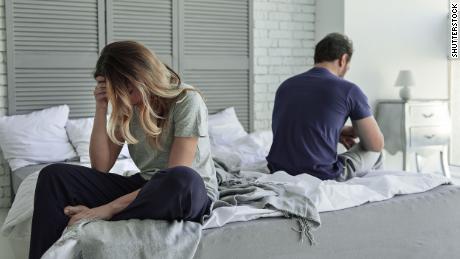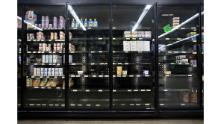Sitting there in the dimly-lit, wood-paneled restaurant in Manchester, our Timberland boots crusted with ice, I reflected on everything that had happened up to that point. My grandma had died three weeks prior. I spent most of the week from Christmas Eve to New Year’s Day under fluorescent lights at her hospital bedside.
The morning after her funeral, I got on a plane to Des Moines, Iowa, to get back to work on CNN’s caucus coverage. My team coordinates the logistics for getting election news on air, and 2020 was already shaping up to be an unpredictable year.
I remember looking in the hotel mirror the morning of the Iowa caucuses and not recognizing myself. My hair had fallen out in clumps in the shower that morning. My face was somehow both bloated and sunken. My makeup no longer matched the color of my skin because my face had turned slightly gray. I was so fatigued, the winter chill winded me after a few seconds.
So I waved my internal white flag, thinking I understood what that entailed. I knew that taking medical leave for residential eating disorder treatment would mean missing pivotal moments in this election cycle. I knew I’d be walking away, albeit temporarily, from a dream job at the moment I needed to prove myself. I knew CNN’s election coverage would be done brilliantly, but without me. I was devastated at the thought of it all. But there wasn’t another option. I knew I needed to do this so that I could do more of what I loved and continue to do it well.
A week before Super Tuesday, I packed my shame and my belongings, and boarded a plane to California.
In the first few days in treatment at the center in Santa Barbara, I learned that I had pretty severe vitamin deficiencies and other serious internal side effects from not nourishing my body properly for so long. Since then, I’ve been slowly working on repairing my body.
Let me be clear, eating disorders are not simply vanity projects. Eating disorders are complex mental illnesses. They are deadly. I came face to face with my own mortality this year and had to ask myself: Did I want to survive? I did. I do.
The center’s routines were strict, but I was with other residents and there were hints of normalcy, like Thursday evenings at the beach. But when Covid-19 came to the US, my already small world became even smaller.
The center banned visitors, and our beach trips were canceled. It all seemed extreme and unnecessary, but I slowly realized the magnitude of our new reality. People started dying. Hospitals became overwhelmed and didn’t have protective equipment for staff. Schools were closed and lessons went online. People lost their jobs. And I felt ridiculous in my situation.
It took me a while to understand that even though the world was experiencing a crisis, it didn’t mean I wasn’t also sick. It didn’t mean I didn’t deserve to get care.
Our only goal as humans during this pandemic should be to survive and help those around us survive, too. We are not obligated to read 100 books, knit blankets for all of our friends, bake banana bread, or learn a new language. Most of all, we are not required to lose weight, follow an intense at-home fitness routine, or fend off the “Covid 15.”
It’s hard for me to fathom what would have happened if I had not gone into treatment when I did. Eating disorders thrive in isolation. That phenomenon, coupled with the societal pressures to emerge from this pandemic no larger than when we entered, would have plunged me even deeper into the throes of it.
After being discharged, I knew that if I wanted to give recovery a fighting chance, I needed support. So I moved back in with my mom and brother in New Jersey, and enrolled in a virtual intensive outpatient treatment program. I packed my bags for my flight home from California with snacks, masks and disinfectant wipes.
Then my aunt called. My grandpa was sick with pneumonia. No one could visit him at the hospital because of coronavirus. He wasn’t getting better, so he had requested to stop care and go home. I couldn’t believe it; I had just said goodbye to my grandma. They were married for almost 60 years.
Two days after I returned home, my grandpa died. I said goodbye through their first-floor bedroom window with a mask and gloves on. Unable to get closer than six feet, my family had gathered on my grandparents’ front lawn to console each other in our grief. A few days later, with the pandemic curtailing services, we stood at the entrance of the military cemetery and watched his casket as it was driven inside.
Like so many people who have lost loved ones this year, I felt so robbed of a proper goodbye. I was furious. I couldn’t relive memories with friends and relatives at his wake. I couldn’t pray to God in our church. I couldn’t drink a few beers with my cousins and laugh about how he did algebra problems for fun at night.
But most of all, I knew that I couldn’t run away from this sadness by trying to starve or purge it out of me. I think there’s a small part of me that was also grieving my eating disorder.
For so long, it had been my greatest coping mechanism. Although I wasn’t officially diagnosed with an eating disorder until I was 23, I know it’s been shape-shifting within me since I was in elementary school. I was 10 years old when I started throwing out my lunch at the school cafeteria.
“I pretty much always feel like I do not deserve to eat,” is how I once described my eating disorder to a friend. I hated myself. If that is the war within me, the eating disorder is the weapon. It is an arrow, released with such a force it bends my flesh and warps my muscles.
I used control over food and my body when I became overwhelmed with life events I could not control. Of course, this was all just a facade. I wasn’t controlling anything. My eating disorder was undeniably controlling me. But no one ever suspected because I was never clinically underweight. I can see now the ways in which society’s lack of understanding of eating disorders allowed me to fall through the cracks.
You can’t always tell if someone has an eating disorder just by looking at them, despite Hollywood portrayals. Yet I was terrified of telling people that I was struggling for so long because I was afraid of their judgments about me and my body. Would my friends think it was because I was shallow? Would my coworkers think I was fragile? Would my family think I was blowing things out of proportion? Or the worst of my fears: Would people think I was lying because I didn’t “look” like someone who had an eating disorder?
I pulled away from a lot of people I care about. I hadn’t even told my childhood best friend about any of it until the day before I left for California. I let my extended family assume I wasn’t around because of the demands of my job. But once I started to tell people, I realized how much it helped me stay accountable. Every single time I was honest about my struggles, people’s arms opened wider and wider until I was enveloped into a cushion of support and comfort. And when I became more open, a surprising thing happened: people were more vulnerable with me, too. People shared their own experiences of grief and mental health. In many ways, I have never felt closer to the people in my life. I’ve never felt so connected.
Even as my mom and brother battled their own grief, unemployment, and other life changes because of the pandemic, they supported me. My mom did the grocery shopping, waiting in long lines and meticulously wiping down the groceries with disinfectant before putting them in the fridge. When I returned to work virtually at the end of April, she placed snacks next to my computer on the kitchen counter, my new makeshift home office. My brother sat with me while I ate my breakfast, so I wouldn’t ever have to eat a meal alone. My bosses and mentors reassured me I was doing the right thing by taking some time off. Now that I’ve returned to my apartment in DC, my friends FaceTime with me to keep me company while I eat meals. They talk with me compassionately about my hesitations and fears around my changing, healing body.
In the thick of my eating disorder, I had lost my ability to enjoy food. To really taste it. I was unable to sit at a table and focus on the people I was sharing a meal with. People I love.
But now, I have learned how beautiful it is to be able to taste my brother’s cheeseburgers fresh off the grill. I have experienced how connected I feel to my mom after sipping homemade mojitos while playing a game of Scrabble. I have felt unbelievably nourished while snacking on cheese and crackers as I tell jokes to my friends at a socially-distanced picnic. I am proud of myself for regularly facing my fear of going to the grocery store, and wearing a mask while doing so.
I want to survive this pandemic and fully recover from my eating disorder so I can do more of these things that make life so full.
I have a hard time subscribing to any sort of “silver lining” thinking during all of this, because I can see that every day around the world, people are getting seriously ill or dying, losing loved ones, losing their jobs, or working grueling hours on the front lines. I know that my experience is one that comes from extreme privilege. I have a job and health insurance that allowed me to take the time off I needed to get better. However, I’m incredibly grateful that my 2020 timeline happened the way it did, even if the months that followed that night in New Hampshire were harder than I could have imagined. Moments of incredible grief and pain have been foundations for me to rebuild relationships with my loved ones and repair the most important relationship I have: the one with myself.
I don’t have any mystical wisdom to share about my experience. I don’t know if I ever will. I just know that reaching out for help and being honest about my grief and mental health has helped me heal. My eating disorder kept me more distanced from my loved ones than the Covid-19 pandemic ever could. In fact, even though we are socially distanced, we don’t have to be alone.













